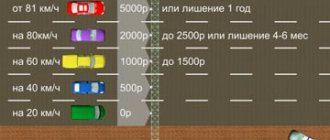The Driver taxi fleet has 60 cars. Every month the company incurs costs due to fines that are overdue for various reasons. For 2 years now, the manager has been thinking about how to establish control over fines in order to avoid losses. Let’s find out how it’s easier to track fines of a legal entity and save on paying them.
In this article:
- Who is fined?
- Consequences of late payment of fines
- Deadlines for payment of fines imposed on a legal entity
- Who can pay traffic fines for an organization?
- Methods for paying fines by an organization
- How to control the repayment of fines of a legal entity
- How to find out that the fine has been paid
Who is fined if the car belongs to an organization?
The taxi driver dropped off a passenger in the wrong place and was caught on camera.
In accordance with Part 1 of Art. 2.6.1 of the Code of Administrative Offenses of the Russian Federation, a fine is imposed on the owner of the vehicle, in our case, on the taxi fleet. The organization will receive a notice of a fine of 3,000 rubles by mail. The legal entity is obliged to pay the fine, but can subsequently recover this amount from the employee; he bears full financial responsibility to the organization (Article 242 of the Labor Code of the Russian Federation).
Also legal. a person has the right to appeal a decision in court if the car was rented out under a contract or the driver used it for personal needs. To do this, you will need to provide evidence to the court.
It is very important to provide the court with payment documents confirming the fact of renting the car.
When a violation is detected by an inspector on the road, a fine is imposed on the driver of the car.
Who records violations and how?
Traffic camera. This is the most common way to track a violation. The camera does this job better than a person - it does not need sleep, food, rest and salary. The camera can be placed on a remote section of the road in any weather.
All cameras, under an agreement with the traffic police, are configured to record various violations:
- stopping and parking rules;
- marking instructions;
- truck ban;
- rules at railway crossings;
- rules at stops and lanes for public transport;
- stops on a highway or pedestrian crossing;
- speeding;
- non-payment of parking;
- driving on the side of the road or parking lot markings.
The traffic police decides what functions a particular camera should have. Often the inspectorate orders “full equipment” only on busy sections of the road, where there are traffic lights, pedestrian crossings, lines for public transport and a lot of markings.
Inspector. If a traffic police officer notices a violation, he will gesture to the driver to stop. Next, he will issue a violation report on the license number, STS and driver’s full name. The police officer will give a copy of the document to the driver, and the original will be given to the traffic police department. There, based on the protocol, a decision on punishment in the form of administrative liability will be issued.
Not long ago, cameras learned to recognize pedestrians not passing through, talking on the phone while driving, and stopping at a “waffle iron” marking.
Consequences of late payment of fines
The taxi driver's parking ticket was lost, and the organization did not pay the fine. After 2 months established by law for paying the fine, the department sent the case to the magistrate's court. From there, the taxi company received a summons.
Part 1 of Article 20.25 of the Code of Administrative Offenses of the Russian Federation provides for 3 types of punishments that a judge can impose for an overdue fine:
- A fine of two times the amount of the unpaid fine, but not less than 1000 rubles.
- Administrative arrest for up to 15 days.
- Mandatory work up to 50 hours.
The organization is guaranteed to receive a double fine if it fails to appeal it in court. Plus the overdue fine itself. In total, the “Driver” will have to pay 9,000 rubles, which is 3 times more than the original amount.
It is better to pay both fines at once and keep the receipt, otherwise the Bailiff Service (FSSP) will handle the collection and the list of sanctions will acquire new ones.
The service will notify you of the initiation of the lawsuit. production in a letter and will give 5 days to voluntarily repay the debt. The period is calculated from the date of receipt of the notification (Clause 12, Article 30 of Federal Law No. 229-FZ). If you do not pay on time, enforcement actions will follow:
- Imposition of enforcement fee. The amount of the enforcement fee for the organization is 7% of the collection amount, but not less than 10,000 rubles (Article 112 Federal Law of October 2, 2007 N 229-FZ)
- Seizure of current account. That is, blocking operations. Or, more often, debiting funds from the account. If there is enough money to pay off the debt and the enforcement fee, the bank will write off the entire amount at once. If there is not enough money at the moment, operations on the account will be suspended, and new receipts will be written off until the debt is fully repaid. After this, account transactions will be restored, but this will take time. (Clause 6, Article 81 of Law No. 229).
- Prohibition on registration actions (change of owner, restoration of documents, repainting, installation of special equipment, vehicle disposal).
Check the organization's fines
Changes in 2021
There have been no significant changes in the procedure and terms of payment, or penalties for unpaid fines. The most recent dates back to 2014. Federal Law No. 307 of October 14, 2014 excluded arrest as a sanction under Art. 20.25 Code of Administrative Offenses for those whose traffic violation was recorded on camera.
In the summer of 2021, the State Duma considered bill No. 254476-7, mitigating sanctions for late payments. It suggested the abolition of double fines and arrest. However, the initiative was not supported by the Government and was rejected in July 2021 as violating the principle of equality of all before the law.
“Expiration date” of a car fine:
According to the authors of the project, work on it will continue. In the meantime, drivers need to remember what delays entail - a double fine, new sanctions under Art. 20.25, forced collection. Even a small debt can grow exponentially. Therefore, it is better not to violate traffic rules, and if this happens, pay fines on time, taking advantage of discounts.
Deadlines for payment of fines imposed on a legal entity
An organization can appeal traffic police fines within 10 days from the date of receipt of the decision. After the expiration of 10 days, the decision comes into force. From this moment on, the organization has 2 months to pay the fine (clause 1 of Article 32.2 of the Code of Administrative Offenses of the Russian Federation).
During the first 20 days from the date of the decision, fines are paid at a 50% discount. With the exception of several types of fines specified in paragraph 1.3 of Art. 32.2 Code of Administrative Offenses of the Russian Federation.
Exception
Sometimes you can successfully avoid paying the main fine and even liability for late payment. To do this, you need to know how the statute of limitations is calculated.
Failure to comply with the punishment within the prescribed period is a non-continuing violation. It occurs at a precisely defined moment - on the 71st day from the issuance of the decision. The statute of limitations for cases in the field of traffic regulations is 3 months. If during this time the bailiff or inspector has not drawn up a protocol under Art. 20.25 of the Administrative Code and did not send him to court, it is impossible to hold the debtor accountable.
Expert opinion
Artemyev Dmitry
Experience as a forensic expert in the field of automotive technical examination for more than 2 years, more than 3 years of work in the field of insurance disputes, appealing guilt in road accidents.
Ask a Question
From the 71st day, the period for execution of the resolution also begins to run - 2 years. During this time, the court or inspector must send a copy of the document to the FSSP. If they do not do this for more than 2 years, the main fine will be lost.
However, the interaction between the bailiffs, the traffic police and the court has already been established, and copies of decisions are sent to the FSSP almost automatically. As soon as enforcement proceedings are opened against the debtor, the 2-year period is suspended.
Proceedings can continue indefinitely until the obligations are transferred to the heirs. The fine will remain on the driver all this time.
Interesting! With open fines, it is impossible to return a driver’s license after deprivation of the right to drive a vehicle (Clause 4.1 of Article 32.6 of the Code of Administrative Offenses of the Russian Federation).
Who can pay traffic fines for an organization?
Who pays the fine of the traffic police organization is defined in Art. 32.2 of the Code of Administrative Offenses of the Russian Federation: “An administrative fine must be paid... by a person brought to administrative responsibility...”, that is, by an organization. Typically, organizations pay fines from their current account. But not all organizations are required to have bank accounts. In addition, correct execution of a payment order is also not an easy task even for an experienced accountant.
Fines for legal entities a person can be paid by both employees of the organization and other legal entities by any means. The main thing is that the payment is processed correctly, and the bank sends the information to the GIS GMP.
Checking fines for legal entities. persons
Try for free
Methods for paying fines by an organization
From the organization's current account
To pay fines through a bank account:
- find payment details in paper orders or on the websites of the State Traffic Safety Inspectorate and State Services;
- generate separate payments for each fine and fill them out correctly;
The bank does not charge any commission.
Learn more about how to fill out a payment order
Cash
- in the bank;
- at the post office;
- via a self-service terminal.
Take with you all orders that require you to pay a fine. If you don’t have a resolution on hand, but the traffic police have a fine in their database, print out a receipt in advance.
A commission of 1-3% is charged.
Through the Internet
- on the traffic police website;
- on the State Services portal;
- through payment systems WebMoney, Yandex.Money, QIWI, etc.;
- through your personal account or the Sberbank Online mobile application.
There is also a 1-3% commission.
Sometimes envelopes with resolutions do not arrive and are lost along the way. When an organization has a lot of cars, the amount of “fines for fines” adds up quickly. Therefore, the organization needs to regularly monitor the emergence of new fines. Otherwise, you may miss the deadline for appeal and payment.
Using the service for payment and control of fines Online Traffic Police
The service minimizes the list of necessary actions for the organization and takes them upon itself:
| What does Online Traffic Police do? | What are the advantages |
| Monitors the appearance of new fines and notifies about them by e-mail and sms | gives a guarantee to appeal them in time or pay with a 50% discount |
| Uploads payment orders to the client bank and generates printed forms of payments and receipts | saves the organization time on manually filling out payment details |
| Sends a CMC to the driver with a link to online payment | drivers pay fines with a bank card |
| Makes online payments by card of any bank, QIWI, etc. | makes payment available to holders of any cards |
| Tracks the results of payments and displays them in your personal account | prevents problems with bailiffs |
| Provides an automatic repayment function for new fines | completely frees the organization from the need to control fines |
| Saves payment history | gives access to information at any time |
Checking fines for legal entities. persons
Do you want to monitor fines, receive a daily report on new fines found and pay them?
Try for free
Where to check
You can check for existing fines:
- on the traffic police website in the section “Interactive services”, “Checking fines”;
- in online banks and payment systems, for example, Sberbank-Online, Tinkov-Bank or Yandex-Money;
- on the State Services portal. To do this, an initial registration with your full name and contact information is sufficient. Information about outstanding fines is displayed on the main page and is updated automatically with each login.
The user indicates the license plate number of the car and the STS number. The check is carried out without reference to the owner of the vehicle or the driver who committed the violation. Information about fines is assigned to the vehicle.
Information about open enforcement proceedings against fine debtors can be found on the FSSP website. You must provide your full name, address, and date of birth for a more accurate search.
Important! If the traffic police database contains information about current fines that have actually been paid off, it means that the bank did not transmit information about the payment to the GIS GMP. To correct this, you need to send a copy of the check or payment receipt to the inspectorate.
How to control the repayment of fines of a legal entity
In accordance with Art. 21.3 Federal Law N 210 dated July 27, 2010, banks and other organizations that accept payment of fines transmit data to the GIS GMP.
GIS GMP is a state information system that stores all data on the payment of fines and other state. payments.
Previously, receipts for payment were carried to the traffic police, now all fine administrators themselves take this information to the GIS GMP. Therefore, it is very important that the paid fine is listed as repaid in the GIS. If the payer or cashier makes a mistake in filling out the payment details or there is a failure in the electronic system, the money will go away and the fine will remain unpaid. After 2 months, the organization will have an unpleasant meeting with the court or bailiffs. Therefore, the repayment of fines must be controlled.
Payment order
It should be understood that due to the delay, it will not be possible to avoid appearing at the traffic police. This must be done before transferring money for an existing fine. The fact is that the amount of debt will increase. Therefore, you will need to obtain a new statement from the traffic police, or wait to receive a letter from the bailiffs indicating the amount of the debt.
You can make payments in the following places:
- At a bank branch.
- Using an ATM or terminal.
- Through electronic wallets that allow you to go through this procedure.
- On the official website of the State Traffic Safety Inspectorate or State Services.
How to find out that the fine has been paid
The organization can check this online on the website of the State Services or the State Traffic Safety Inspectorate. If the payment is successful, after 4 - 5 days the fines disappear from the list of unpaid ones. This means that the fine has been paid.
In addition to traffic police fines, there are also fines from MADI, AMPP (paid parking lots in Moscow), Rostransnadzor (fines for Platon), etc. All these fines are not on the traffic police website; you need to look for them on other resources. Thus, you will have to regularly check each fine in each system separately, which greatly complicates the process. Simplify it using the Onlinegibdd.ru service. The service takes responsibility for monitoring the organization’s fines. Regardless of the payment method, it automates all necessary operations:
- tracks the repayment status in the Federal Treasury GIS GMP database and shows the result for all fines for all cars in the organization’s personal account;
- monitors the presence of enforcement proceedings with bailiffs, notifies about them and provides details for payment;
- integrates with the automated control system of organizations that record fines in the accounting system (for example, 1C);
- A car lawyer provides free consultations on issues of payment and repayment of fines.
Don't miss new useful publications
We will tell you about the intricacies of the legislation, help you understand it and tell you what to do in controversial situations.
Is it possible to pay an overdue fine?
As already mentioned, exactly two months are given to pay the issued fine. The countdown begins from the moment when it is no longer possible to challenge the decision. It comes into force exactly 10 days after the penalty is imposed. Essentially, a person will have 70 days to resolve a money issue.
Some people do not remember about the existing fine or, for personal reasons, do not have time to pay it off on time. You should not count on the fact that traffic police officers will forget about the issued receipt. As soon as there is a delay, the case will be taken to court. This means that violators will be dealt with by bailiffs, whose task is to force the person to pay a fine.
Of course, it is possible to clear an unpaid receipt. However, the amount will be higher due to the fact that the person did not undergo the procedure in a timely manner. Therefore, you should transfer money on time if you do not want to get into an unpleasant situation anymore.










